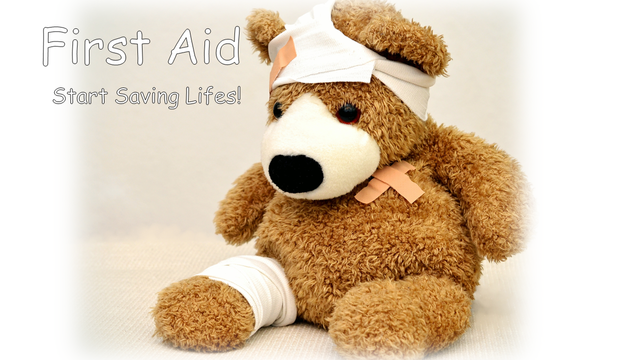First Aid - Start Saving Lifes!

Hello fellows!
During the last week I had a revision on first aid due to the start of my studies at medical school in Berlin, Germany.
I realized how important it is to be able to render first aid, thus I want to share with you everything I know concerning this topic - so be prepared to learn something new or refresh your knowledge.
First Aid in a nutshell
So just to make clear: First Aid is so easy - still a lot of people are simply unable to cope an emergency.
Of course there are a lot of other circumstances to consider in a real accident, but that does not mean you can not prepare yourself.
I guess everbody here did at least once in his lifetime an educational course about first aid - in Germany and Swiss this is mandatory to claim the driving license.
Nevertheless I am pretty sure that after at least a couple of years most of the knowledge is forgotten. That is totally normal and the reason why I think that training and recapitulating the correct behavior in an emergency case is important.
In today's fast paced world such emergencies could occur everywhere at anytime - a cardiac infarction, stroke or simple loss of consciousness.
Chain of Survival
So there is a easy guide to follow step by step - the so-called Chain of Survival. So let's break it down!

Step 1: Try to talk to the person. If the person does not answer, call for help. Try to get the person out of the danger zone if necessary. Now check if the person is breathing normal or not. Do you see something stuck in the throat you could get out? - DO IT!
Step 2: Immediately call the ambulance and communicate the information you got. But do not waste time, if the person is NOT breathing! If the victim does not breath normally, the ambulance has to send an emergency doctor - so this will be an important question to answer.
Step 3: Now it's time for the cardiopulmonary resuscitation (CPR). Start to pump! - the chest compression should be about 5 cm (2.0 in) deep and at a beat rate of about 100 to 120 bpm. After 30 pushes it's time to provide artificial ventilation, either trough the mouth or nose.
Studies have shown that the CPR is much more important than the ventilation, so if you are not able to properly provide ventilation or your attempts were not successful - just focus on the chest compression!
A lot of people are way to cautious during the CPR, but always keep in mind that having some broken rips is definitely better than dying due to a cardiac arrest!
When somebody heard your cry for help and you are at least 2 people - tell him to get a heart defibrillator and follow the given manual. Keep on pumping until the defibrillator tells you to keep distance to the victim during delivering the shock.
Step 4: A common mistake is that people stop the CPR as soon as the ambulance arrives at the accident location - please don't do that! Just listen to what the paramedic is telling you - when he is ready to replace you, he will tell you. Now it is the job of the emergency doc to do whatever he can in this situation. After his treatment usually the victim has to get to the hospital as fast as possible.
Step 5: Now the victim arrives at the hospital an will be prepared for an e.g. emergency operation. You are no longer part of the rescue mission - you have done everything you can!
So these are the basics of the basic life support or the general rescue cycle. Bear in mind that there might be slight discrepancies in the Chain of Survival depending on where you live and what is being recommend to you by your local institutions. Nevertheless the idea is the same.
Failure to render assistance
In a lot of countries (including Germany) you must help e.g. a victim of a car accident, if you are able to. Otherwise you can be sued. The only thing you can pass on is the artificial ventilation, but as already mentioned this is not the most important thing.I hope you could learn or refresh your knowledge, so you will be able to save life! Of course every accident will be an uncomfortable situation and you will never get used to it, but you can still be prepared and more self-confident in such an incident.
See you soon! #SteemOn
Noogie
Congratulations @noogie! You received a personal award!
Click here to view your Board
Do not miss the last post from @steemitboard:
Congratulations @noogie! You received a personal award!
You can view your badges on your Steem Board and compare to others on the Steem Ranking
Vote for @Steemitboard as a witness to get one more award and increased upvotes!